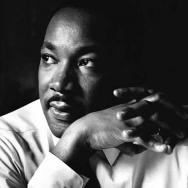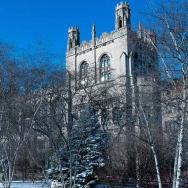As Cheryl Brown Henderson spoke at the University of Chicago’s annual commemoration of the life and legacy of Dr. Martin Luther King Jr., she reminded us of King’s teaching that we cannot be more concerned about protest marches than the conditions that brought about the necessity to march.
“To make changes, we have to go to the streets and then into city hall, to school board meetings, and into the voting booth,” she said.
Brown Henderson knows something about social advocacy. Her late father, the Rev. Oliver L. Brown, was the lead plaintiff in the landmark 1954 Supreme Court case Brown v. Board of Education.
“The civil rights victory that was Brown v. Board dismantled the legal framework for segregation. But the myth of Brown is that it was something just my father did,” she said Feb. 21, delivering the keynote address in UChicago’s 32nd annual event honoring Dr. King. “Like the Civil Rights movement, Brown was a movement. It was collective action, involving hundreds of people and years of planning.”
King realized that although Brown was law, the country was dragging its feet on implementing it. By working on the Montgomery bus boycott—the longest sustained protest in the nation’s history—and by convening three marches on Washington, Brown Henderson said, King urged the United States put Brown v. Board into practice.
Held at Rockefeller Memorial Chapel, where King himself spoke twice—in 1956 and 1959—this year’s event was also live-streamed to a global audience. Brown Henderson is the founding president of the Brown Foundation for Educational Equity, Excellence and Research, which has provided scholarships to underrepresented students, established libraries in low-income communities, and sponsored programs on diversity and educational issues. Her keynote was followed by a discussion between Pastor Chris Harris and Prof. Deborah Gorman-Smith, dean of the Crown Family School of Social Work, Policy and Practice.
President Paul Alivisatos also delivered remarks, speaking at an MLK event for the first time since he began his UChicago tenure last September.
“The values and ideals that Dr. King stood for both align with our own mission at the University of Chicago and challenge us to do more,” Alivisatos said. “To live into Dr. King’s high calling pushes us to recall his courage and reminds us to have the willingness to be uncomfortable, to work each day to address the great problems of our time, and bring our scholarship and resources to bear on improving the quality of human life for all people.”
In Brown Henderson’s remarks, she underscored that in many ways, the United States didn’t have a single, quick response to Brown: it’s still responding. She noted that in her own state of Florida, the governor has attempted to criminalize marches and protests, giving Brown Henderson a sense of deja vu.
“Many of us in my age group have lived through this before,” she said. “I call this 2.0, because we are reliving an era when a cadre of segregationist politicians at every level boldly asserted power. People are counting on complacency, which is deadlier than a lot of the legislative actions being taken now.”
After Brown Henderson’s address, Pastor Chris Harris underscored the impact that legislation and other policy changes can have on a local level. “I still firmly believe the best violence prevention is access to a world-class education for our children,” said Harris, whose Bright Star Community Outreach has partnered with many organizations, including UChicago Medicine, to bring educational enrichment and anti-violence programming to Bronzeville. “The best way to bring system change is to do things with the community.”
Since its inception in 1990, UChicago’s annual commemoration has featured prominent speakers, including President Barack Obama, Angela Davis and the Rev. Jesse Jackson. The event also provided an opportunity to recognize the latest recipients of the University’s Diversity Leadership Awards, given each year to UChicago faculty, alumni and staff who have made a significant impact in advancing diversity and social justice.
This year’s celebration—which included remarks from second-year undergraduate Esi Koomson and Ph.D. student Victor Mendoza—also featured performances from the Chicago Children’s Choir and soprano Whitney Morrison.
“Dr. King described the three evils of society as racism, materialism and militarism, as he concluded that violence in neighborhoods was inseparable from violence between nations,” said the Rev. Dr. Maurice Charles, dean of Rockefeller Chapel, in his closing remarks.
Pointing out that each of the evening’s speakers addressed some aspect of this “unholy trinity” of poverty, racism and violence, Charles said we are not left without hope—be it individual citizens challenging unjust laws, grassroots efforts to address violence in our communities, and even the gift of music that “lightens our steps when the load seems too heavy to bear.”
“We are confronted with the fierce urgency of now,” said Charles, quoting from Dr. King’s final book, Where Do We Go From Here. “‘We still have a choice today. Nonviolent coexistence or violent coannihilation. This may well be our last chance to choose between chaos and community.’”
—A highlights video of the 2022 MLK commemoration event will be available soon.

